For nearly a decade, Taiz governorate in Yemen has been at the heart of one of the world’s most protracted conflicts. A new initiative funded by the European Union and implemented by Cordaid in partnership with the local NGO Nahda Makers Organisation (NMO) is offering a lifeline.
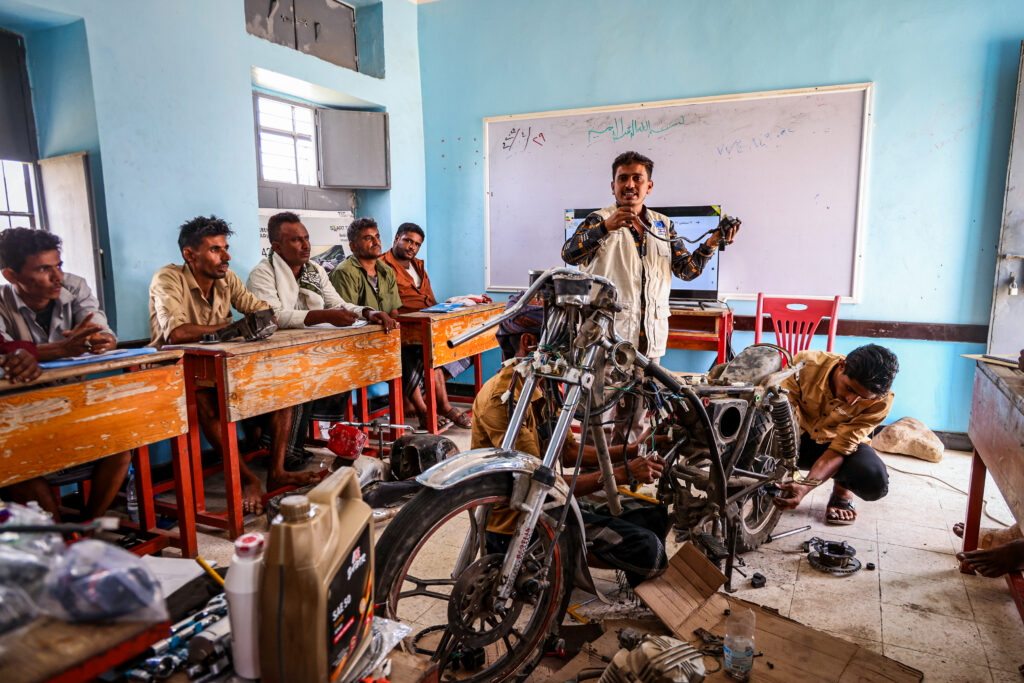
Daily life in Taiz is marked by displacement, insecurity, and grinding poverty. In the districts of Mawza and Al-Maafer, the war’s frontline scars run deep: families forced to flee violence now crowd into host communities already stretched beyond their limits. Food prices climb as incomes vanish, and with few opportunities to earn a living, families are increasingly forced into desperate survival strategies – borrowing, skipping meals, or sending children to work.
Watch this video documentary created by NMO and meet the people participating in the project:
A Lifeline Through Skills and Opportunity
Against this bleak backdrop, Cordaid and NMO aim to restore people’s ability to support themselves. By doing so, it seeks to break the cycle of dependency on international aid that many Yemenis face.
Over the course of 18 months, the project directly supported 450 of the most vulnerable people – half of them women, many of them displaced by conflict, and some living with disabilities. Participants completed an eight-week vocational training programme tailored to market needs and local opportunities. Training covered practical skills such as mobile phone repair, sewing, carpentry, and hairdressing – skills that can quickly generate income even in unstable conditions.
A Holistic Approach to Self-Reliance
What makes this programme stand out is its holistic design. Participants are selected from households currently receiving emergency cash assistance through the Yemen Cash Consortium, which the European Union also funds.
This cash support ensures that families can meet their most urgent needs – food, medicine, and shelter – while they participate in vocational training. Without this safety net, many would not be able to attend courses or plan for the future.
The training, combined with start-up kits and follow-up coaching, is specifically designed to help participants transition from aid dependency towards long-term self-reliance. It is this combination – covering immediate needs while building sustainable livelihoods – that gives the programme its strength.
Building Businesses and Resilience
To ensure participants can turn new skills into livelihoods, 400 of the 450 participants received business start-up kits valued at up to $500. These are tailored to individual business plans and followed by six months of coaching and mentoring. Life skills training complements technical instruction, with modules on financial literacy, climate-conscious practices, and basic health and hygiene – all designed to strengthen resilience in a fragile environment.
For women, the programme offers a crucial opening. In Taiz, where cultural barriers often limit access to work, the project creates space for female-headed households and provides safe, accessible environments for their participation.
Stories of Change and Hope
The stakes could not be higher. Without such interventions, families in Taiz will continue sliding deeper into hunger and vulnerability. By investing in people’s capacity to earn an income, this project is a step towards dignity, stability, and hope in one of Yemen’s hardest-hit regions.
What this means in individuals’ lives is best illustrated by the participants themselves. Fahd Mohammed, who learned to install and maintain solar energy systems, is bringing power and opportunity to his village. Sawsan Mohammed, a displaced woman caring for an injured husband, supports her family by tailoring. Abdullah Ali, once a farmer and generator repairer, has turned his skills into a motorcycle repair business. And Bint Ahmed, a mother of two, is earning an income and building confidence through mobile phone repair. Of the 450 stories, these four demonstrate how the project is helping individuals transition from survival to self-reliance.
Beyond Livelihoods: Safeguarding Dignity
Ultimately, the initiative’s overarching goal extends beyond skills training and business support. It is about safeguarding dignity and preventing vulnerable families from being forced into negative coping strategies such as child labour, early marriage, or unsafe migration.
By equipping participants with viable livelihood options and ensuring their immediate needs are met, the project reduces reliance on humanitarian assistance while fostering resilience against future shocks, including those linked to conflict and climate change.
The emphasis on safety, gender sensitivity, and meaningful inclusion ensures that women, men, and marginalised groups alike can participate fully and benefit equitably. In doing so, the programme not only restores livelihoods but also strengthens protection, stability, and the foundations for a more hopeful future in Taiz.
Bint Ahmed: ‘With Every Device I Fix, I Build New Hope for My Family’
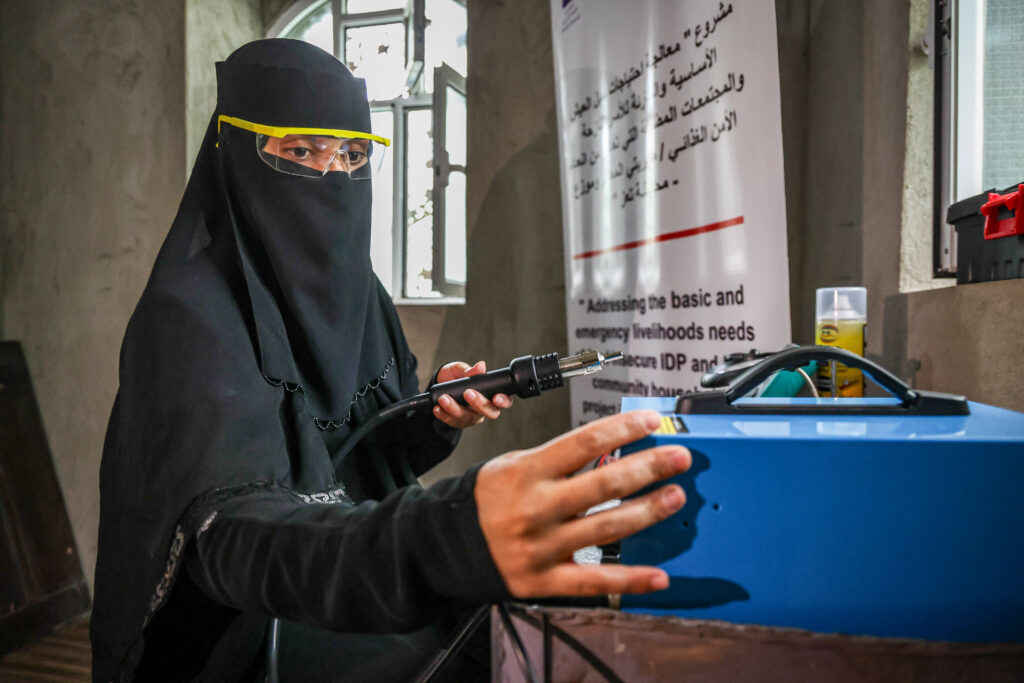
Life has been a struggle for Bint Ahmed. A mother of two and a medical assistant student, she and her husband worked hard but often fell short of meeting their family’s needs. ‘Some days even buying medicine or school supplies felt impossible,’ she recalls. ‘The war and the lack of jobs left us with very few options.’
When she heard about a vocational training programme, she made a bold decision. No woman in her village had ever worked in mobile phone repair. But Bint saw opportunity where others saw barriers. ‘I wanted to try something different, to give my children a better future,’ she says.
During the eight-week training, she learned to repair common phone problems, including replacing screens and batteries, fixing charging ports, and installing apps. At the end of the programme, she received a complete toolkit to start her own business. ‘Getting those tools meant everything,’ she explains. ‘It was like someone saying: we believe in you.’
From her modest home, she now repairs phones for her neighbours and those in nearby villages. Each job not only provides income but also builds her confidence. ‘When I fix a phone and hand it back working, people thank me with a smile. That’s when I feel proud – I’m not only providing services to the people of my village, I’m also supporting my family with my own hands.’
Her success is already inspiring others. Women in her community, once hesitant to step outside traditional roles, now see new possibilities. ‘If I can do this, so can they,’ she says.
Abdullah Ali: ‘The Training Was My Bridge to Independence‘
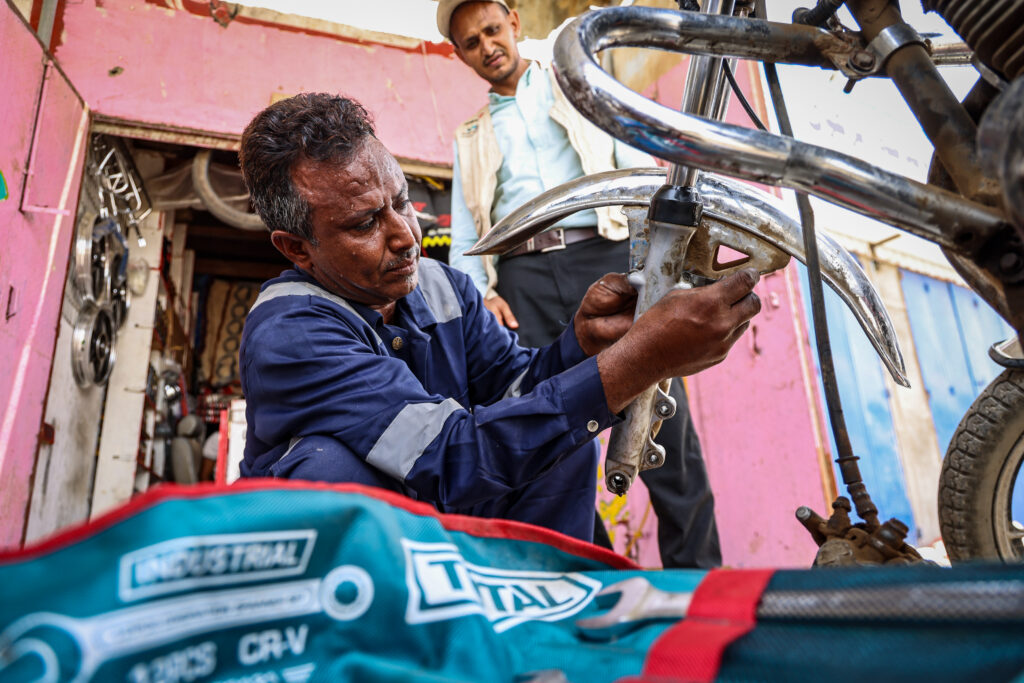
Abdullah Ali grew up in a simple rural village surrounded by crop fields and small livestock pens. From a young age, he dreamed of education and a better future. He enrolled in the College of Education to become a teacher, envisioning a life spent guiding children toward opportunities.
But reality was harsh. Employment was scarce, and he was forced to work in agriculture and generator maintenance to provide for his large family of eight children.
Then the war tore through his life in the most unimaginable way. ‘My house was bombed, and I lost eleven members of my family in one instant, including my brothers, their children, and my mother,’ Abdullah recalls.
The trauma was unbearable, and he had no choice but to flee, moving from one shelter to another, struggling to find work and rebuild a life. After years of displacement, Abdullah returned to his village and found it scarred by conflict, with homes destroyed, shops closed, and markets struggling to supply food. Jobs were few, and daily life remained a battle.
Hope arrived in the form of the vocational training programme in motorcycle maintenance. Abdullah, already experienced in technical repairs, joined with determination. ‘The training wasn’t just learning to fix motorcycles. It gave me confidence, and in the end, I received a full toolkit. That was my bridge to independence,’ Abdullah remarks.
Shortly after the training, Abdullah opened a workshop in his village. People bring bikes with broken chains, dead batteries, and damaged brakes. ‘I repair two to three motorcycles every day. And every motorcycle I fix is another step towards stability for my family,’ he says. ‘And I urge my clients, especially the young ones, they seize any training opportunities they can find, and to start working right away, even on a small scale. Because with time,’ he remarks, ‘small steps can grow into something bigger.’
Sawsan Mohammed: ‘I Feel I Have a Place in This World
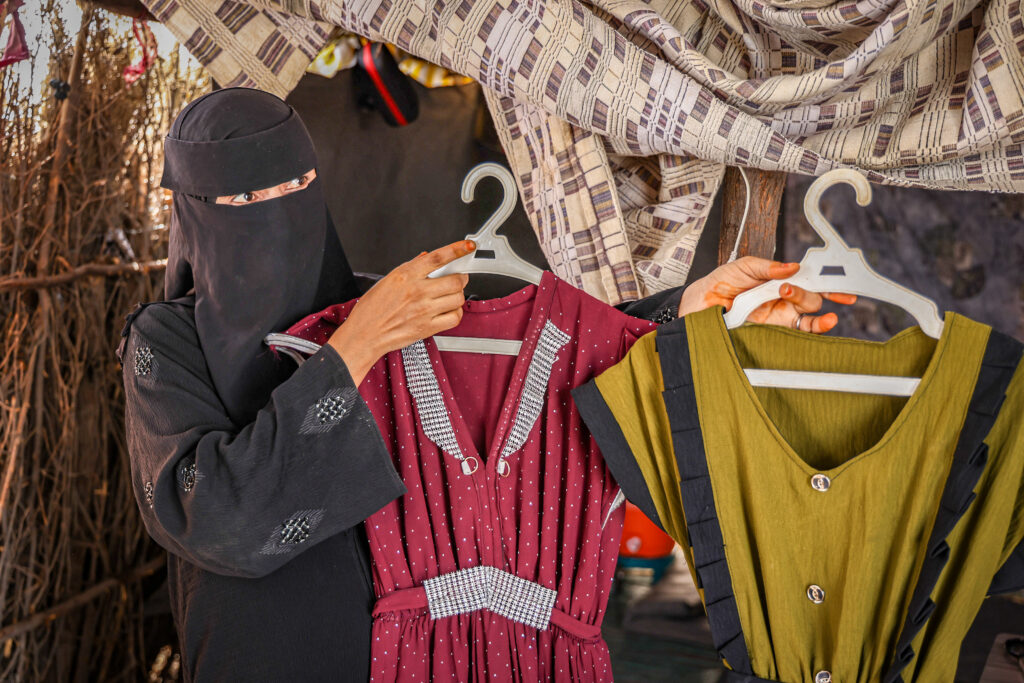
Sawsan Mohammed lived a quiet, simple life with her husband and three children. She had completed her secondary education and supported her family in a household that relied entirely on her husband’s income.
But life changed abruptly when her husband suffered a severe spinal injury during the war, leaving him unable to work. Their home was later destroyed in a fire, along with most of their belongings, forcing the family into a displacement tent. ‘Suddenly, everything I knew was gone,’ Sawsan recalls. ‘We had nothing, and I had to find a way to survive.’
Initially dependent on humanitarian assistance and the generosity of her neighbours, Sawsan attempted to support her family by selling ready-made clothes within the camp. ‘However, fluctuating prices and unpaid customer debts quickly made it impossible to continue. The challenges felt endless,’ she says.
Her situation began to change when she learned about a vocational training programme run by NMO in partnership with Cordaid. Sawsan immediately applied for the sewing course, an area she had always been passionate about.
Over several weeks, she learned basic and advanced tailoring skills, and at the end of the programme received a complete vocational kit with all the tools she needed to start her own small business. It was a turning point. ‘I started sewing clothes and selling them. Little by little, I became able to provide the basic needs and secure daily food for my family. This increased my self-confidence and sense of security,’ Sawsan explains. What began as a survival strategy has since become a source of pride and independence.
Today, Sawsan runs a small tailoring business inside the camp, sewing clothes for residents and fulfilling women’s orders. Her income now covers her family’s daily needs, and she no longer has to wait for aid.
Her work has gained recognition within the camp, and demand continues to grow. Sawsan is not only self-reliant but also a source of stability and inspiration for her family and neighbours. ‘I feel I have a place in this world,’ she says. ‘I can provide for my children and live with dignity.’
Fahd Mohammed: ‘It Felt Like a Door Opening When All Other Doors Seemed Closed
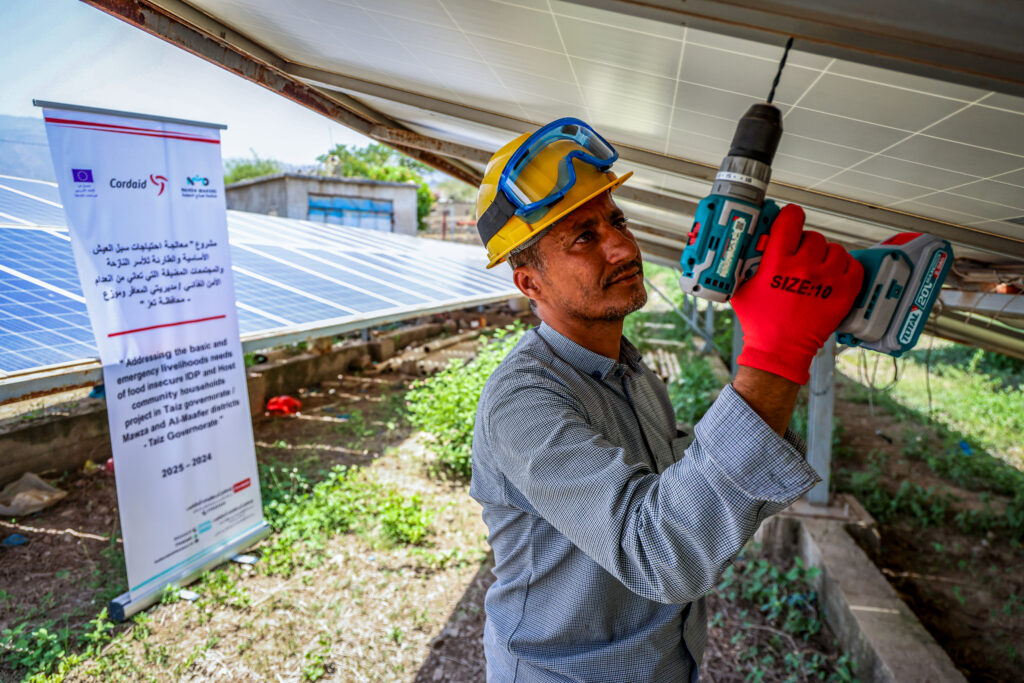
In Shiha village, Al-Ma’afer district, Fahd Mohammed grew up with significant responsibilities from a young age. He left school in the ninth grade to help support his family and spent years working as a street vendor, selling vegetables to make ends meet.
Life had become a daily struggle. The war in Yemen had worsened conditions in his community: schools, clinics, and basic services were disrupted, and even securing food and medicines was a challenge.
Fahd feared he had run out of options. ‘I went through challenging times and was unable to provide even the most basic necessities for my children,’ he recalls. His situation became even more desperate after a traffic accident left him with a slipped disc, making it impossible to continue physically demanding work like street vending.
Community workers from NMO told Fahd about a vocational training programme in solar energy installation and maintenance. Fahd seized the opportunity. ‘I had been looking for something like this for years. It felt like a door opening when all other doors seemed closed,’ he recalls.
During the training, Fahd learned to operate and maintain solar energy systems, acquiring technical skills he could immediately apply. With a full set of tools and guidance from the programme, he established a small service centre in his home, offering solar power solutions to his village and neighbouring communities. ‘Every panel I install or repair feels like I’m bringing light into someone’s home – and into my own life,’ he explains.
Since starting his business, Fahd has installed twelve solar panels, a complete solar system for a residential building, and five inverters, while maintaining more than fifty panels for local households. Tasks such as replacing fuses, realigning panels to face the sun, and inspecting batteries have become part of his daily routine.
Looking ahead, Fahd dreams of opening a fully equipped shop specialising in solar energy systems. ‘I want people to trust my work and know they can rely on me for quality and service,’ he says.
